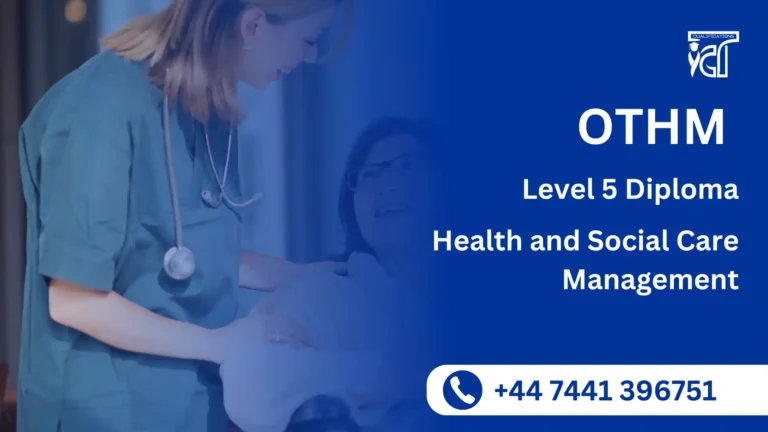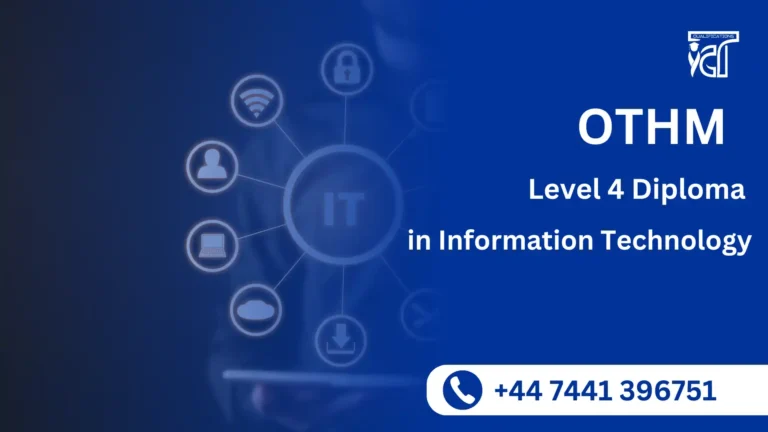Psychology is the scientific study of the mind and behaviour, playing a pivotal role in understanding human thoughts, emotions, and actions. The OTHM Level 4 and Level 5 Combined Diploma in Psychology offers a comprehensive and structured qualification for learners seeking to build a strong foundation in psychological theories and applications.
Regulated by Ofqual and internationally recognised, this combined diploma is equivalent to the first two years of an undergraduate degree, making it an ideal stepping stone for academic progression or career development in psychology-related fields.
The OTHM Level 4 and Level 5 Combined Diploma in Psychology introduces learners to core psychological concepts, research methods, and the application of psychology across various contexts. This diploma covers foundational theories and advanced topics such as cognitive processes, developmental psychology, abnormal psychology, and social behaviour.
Designed for flexible learning, the course is 100% assignment-based, enabling learners to study without the pressure of examinations. It is suitable for individuals aspiring to pursue careers in psychology, counselling, social work, human resources, and other related sectors.
This combined diploma delivers a balanced curriculum that integrates theoretical knowledge with practical insights. It prepares students to critically analyse psychological phenomena, conduct research, and apply psychological principles in real-world situations.
The OTHM Level 4 and Level 5 Combined Diploma in Psychology is a comprehensive qualification for those looking to explore the fascinating field of psychology and develop practical skills for diverse career paths. With its flexible learning format and internationally recognised accreditation, this diploma provides an excellent foundation for academic advancement and professional success.
Enroll now and begin your journey into the science of human behaviour and mind.
OTHM Level 4 and Level 5 Combined Diploma in Psychology
The OTHM Level 5 Extended Diploma in Psychology comprises twelve mandatory units, totaling 240 credits and requiring 2,400 hours of Total Qualification Time (TQT). The recommended Guided Learning Hours (GLH) for this qualification is a minimum of 1,200 hours.
To successfully obtain the diploma, learners must complete 240 credits, with 120 credits at Level 4 (covering six units) and 120 credits at Level 5 (covering six units).
All units in this qualification are mandatory.
Level 4 Mandatory units:
| Sr# | Unit Title | Credits | GLH |
|---|---|---|---|
| 1 | The Scope of Psychology | 20 | 100 |
| 2 | Introduction to Social and Developmental Psychology | 20 | 100 |
| 3 | Biopsychology | 20 | 100 |
| 4 | The Development of Attachments | 20 | 100 |
| 5 | Processes of Human Memory | 20 | 100 |
| 6 | Research Methods and Investigating Psychology | 20 | 100 |
Level 5 Mandatory units:
| Sr# | Unit Title | Credits | GLH |
|---|---|---|---|
| 1 | Psychological Approaches to Depression and Schizophrenia | 20 | 100 |
| 2 | Individual Differences: Intelligence; Personality and Criminology | 20 | 100 |
| 3 | Visual Perception | 20 | 100 |
| 4 | Social Psychology: pro and anti-social behaviour | 20 | 100 |
| 5 | The Diversity of Addiction | 20 | 100 |
| 6 | Contemporary Issues and Debates in Psychology | 20 | 100 |
GLH (Guided Learning Hours) and TQT (Total Qualification Time) are terms commonly used in vocational qualifications to help define the amount of time a learner is expected to spend on heir studies.
1. GLH (Guided Learning Hours)
GLH refers to the number of hours a learner spends being directly taught, supervised, or supported during their course. This includes the time spent in activities such as:
- Classroom instruction
- Practical workshops
- One-on-one tutoring or mentoring sessions
- Online learning sessions with tutor support
In other words, GLH represents the time that learners are actively engaged with their instructors or learning activities.
2. TQT (Total Qualification Time)
TQT represents the total amount of time a learner is expected to invest in completing a qualification, including:
- GLH (Guided Learning Hours): Time spent on direct learning, as explained above.
- Self-Directed Learning: This includes time spent on independent study, research, assignment completion, preparation for exams, and any other work the learner does outside of direct teaching hours.
TQT is a broader measure that includes all the time required to achieve the qualification. It helps learners and employers understand the overall commitment required for the qualification.
Key Differences Between GLH and TQT:
- GLH focuses on direct learning with guidance or supervision.
- TQT includes GLH as well as independent study time and other learning-related activities.
Example:
If a qualification has a TQT of 600 hours and a GLH of 250 hours, it means the learner should spend 250 hours in direct learning (classroom, online, or tutor-led sessions) and 350 hours on independent study or research.
Learning Outcomes of OTHM Level 4 and Level 5 Combined Diploma in Psychology
The Scope of Psychology
- Understand the scope of psychology.
- Understand the theoretical approaches to psychology.
- Understand psychology as a science.
- Understand ethical issues in psychology.
Introduction to Social and Developmental Psychology
- Understand the key methodological issues and theorising in social psychology.
- Understand the main theoretical views in cognition and development.
- Understand theories of gender development.
- Understand adolescence as being a time of physiological and behavioural changes.
Biopsychology
- Understand the structure and function of the nervous system and the system’s location in the brain.
- Understand the function of neurons and the process of synaptic transmission.
- Understand ways of studying the brain
- Understand the processes of defending (fight) or running away to safety (flight).
The Development of Attachments
- Understand learning theory of attachment.
- Understand caregiver-infant interactions, reciprocity and interactional synchrony.
- Understand the development of attachment in human and animal studies.
- Understand individual and cultural variations in attachment.
Processes of Human Memory
- Understand the multi- store model of memory, sensory register and short- and longterm memory.
- Understand the working memory model.
- Understand types of long-term memory.
- Understand explanations for forgetting.
Research Methods and Investigating Psychology
- Understand the experimental methods applied in psychology.
- Understand research methods.
- Understand types of data analysis and evaluation.
- Be able to carry out research design and review.
Psychological Approaches to Depression and Schizophrenia
- Understand the diagnosis and classification of schizophrenia.
- Understand therapies for schizophrenia and the role of the clinical psychologist.
- Understand the diagnosis and classification of depression.
- Understand therapies for depression.
Individual Differences: Intelligence, Personality, and Criminology
- Understand how intelligence is conceptualized
- Understand the classification of theories of personality.
- Understand the concepts of criminological psychology
- Understand offender profiling
Visual Perception
- Understand the structure of the visual system.
- Understand theories of visual perception.
- Understand the development of perceptual abilities
- Understand visual perceptual development in the debate of nature v nurture.
Social Psychology: pro and anti-social behavior
- Understand aggression and antisocial behaviour.
- Understand media influences on antisocial behavior
- Understand research studies relating to social psychological theories of aggression.
- Understand human altruism and bystander behaviour.
The Diversity of Addiction
- Understand the concept of addiction.
- . Understand the explanations for substance abuse and dependence.
- Understand the risk factors for addiction.
- Understand approaches to the treatment of drug dependence
Contemporary Issues and Debates Psychology
- Understand codes of conduct and ethical guidelines.
- Understand the role of psychologists.
- Understand bias in psychological research and theory.
- Understand the contribution of debates to the field of psychology.
Benefits – OTHM Level 4 and Level 5 Combined Diploma in Psychology
- Prepares for Diverse Professional Paths
Suitable for careers in healthcare, education, social services, HR, and beyond, broadening employment prospects. - Ofqual-Regulated and Internationally Recognised
This qualification meets UK standards and is accepted by employers and educational institutions worldwide, ensuring global credibility. - Comprehensive Coverage of Psychology
Provides a solid foundation in core psychological theories, research methods, and practical applications across various fields. - Equivalent to Two Years of Undergraduate Study
Offers 240 credits, giving learners a strong academic foundation equivalent to the first two years of a bachelor’s degree. - 100% Assignment-Based Assessment
Allows flexible study without the pressure of exams, ideal for working professionals or learners with busy schedules. - Enhances Career Opportunities
Prepares learners for roles in psychology, counselling, social care, human resources, and other related sectors. - Supports Further Academic Progression
Provides a pathway to Level 6 qualifications, undergraduate degrees, or professional training in psychology and related fields. - Develops Critical Thinking and Analytical Skills
Equips learners to critically evaluate psychological research and apply evidence-based approaches in practical settings. - Flexible Learning Options
Available through online and blended learning, enabling study at a pace and style that suits individual needs. - Builds Interpersonal and Counselling Skills
Focuses on communication and counselling theories that are valuable in many professional and personal contexts.
The OTHM Level 4 and Level 5 Combined Diploma in Psychology is designed for a wide range of learners interested in understanding human behaviour and pursuing careers in psychology and related fields. This course is ideal for:
- Aspiring Psychology Professionals
Individuals aiming to build a strong foundation in psychology before advancing to higher qualifications or careers in the field. - Working Professionals
Those in healthcare, social work, education, or human resources seeking to enhance their understanding of psychological principles to support their roles. - Students Planning Higher Education
Learners preparing to pursue undergraduate degrees in psychology, counselling, social sciences, or health-related disciplines. - Career Changers
Individuals from different sectors looking to transition into psychology, counselling, or social care professions. - Counsellors and Support Workers
Professionals who want to deepen their knowledge of psychological theories and develop practical counselling skills. - International Learners
Students worldwide seeking a UK-regulated, globally recognised qualification to support their academic and career ambitions. - Individuals Preferring Flexible Study
Learners who require assignment-based assessment and flexible learning options to balance study with work or personal commitments.
This diploma is perfect for anyone passionate about exploring the science of human behaviour and applying psychological knowledge in professional or academic settings.
Entry Requirements
Register Now
Qualification Process
Qualification Process OTHM Level 4 and Level 5 Combined Diploma in Psychology
- Self-Assessment:
Begin by evaluating your eligibility to ensure you meet the qualification requirements, including work experience, knowledge, and language proficiency. - Registration:
Complete your registration by submitting the required documents, including a scanned copy of a valid ID, and paying the registration fee. - Induction:
An assessor will conduct an induction to confirm your eligibility for the course and explain the evidence requirements. If you do not meet the criteria, your registration will be canceled, and the fee will be refunded. - Assignments & Evidence Submission:
Provide all assignments and the necessary evidence based on the assessment criteria outlined in the course. If you are unsure of the required evidence, consult with the assessor for guidance on the type and nature of evidence needed. - Feedback and Revision:
The assessor will review your submitted evidence and provide feedback. Evidence that meets the criteria will be marked as “Criteria Met,” while any gaps will be identified. You will be asked to revise and resubmit if needed. - Competence Evidence:
Submit final evidence demonstrating that all learning outcomes have been met. This evidence will be marked as “Criteria Met” by the assessor once it is satisfactory. - Internal Quality Assurance (IQA):
The Internal Quality Assurance Verifier (IQA) will review your evidence to ensure consistency, quality, and compliance with standards. - External Verification:
The IQA will submit your portfolio to OTHM External Quality Assurance Versifier (EQA) for final confirmation. The EQA may contact you directly to verify the authenticity of your evidence. - Certification:
Upon successful completion of all checks, OTHM will issue your official certificate, confirming that you have attained the OTHM Level 4 and Level 5 Combined Diploma in Psychology.







